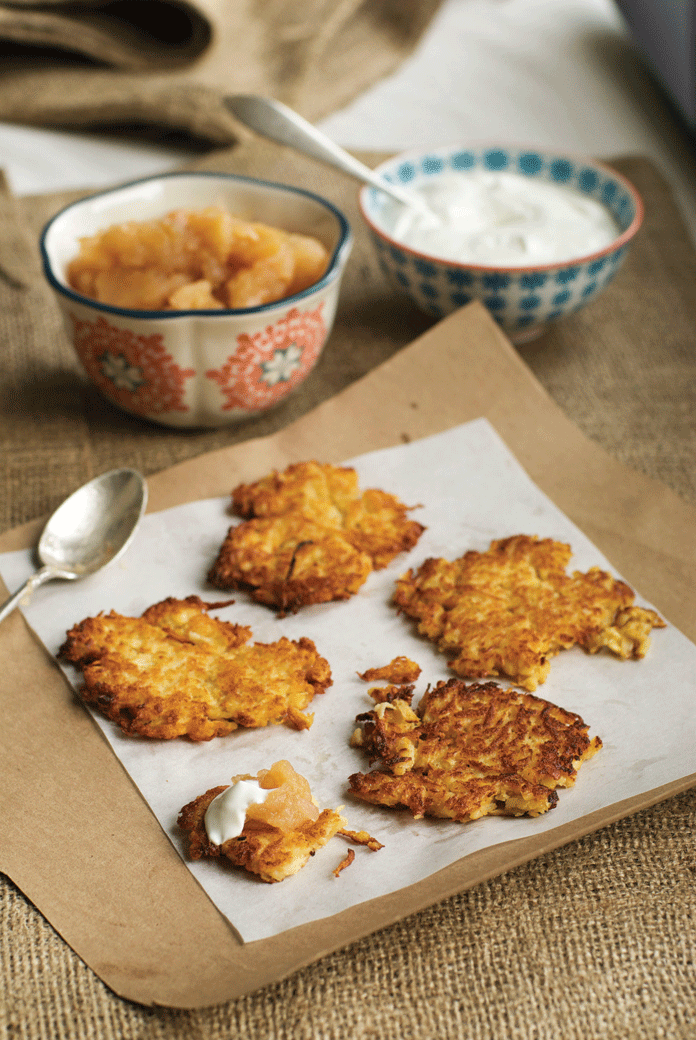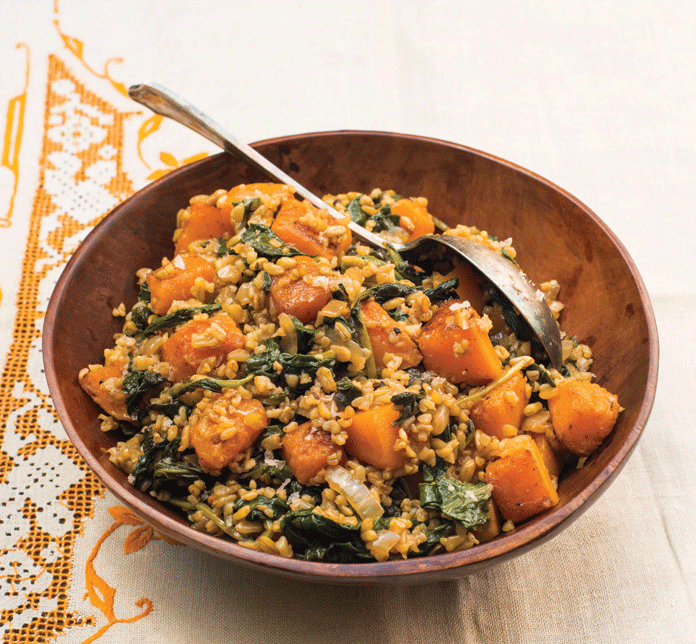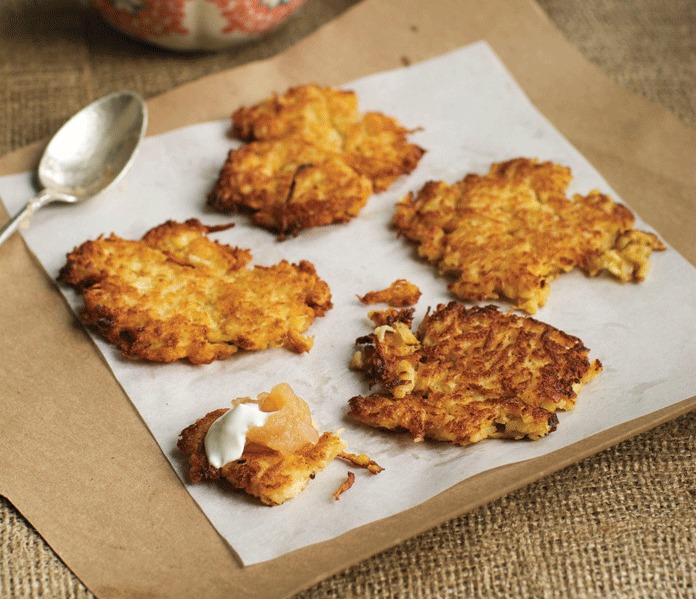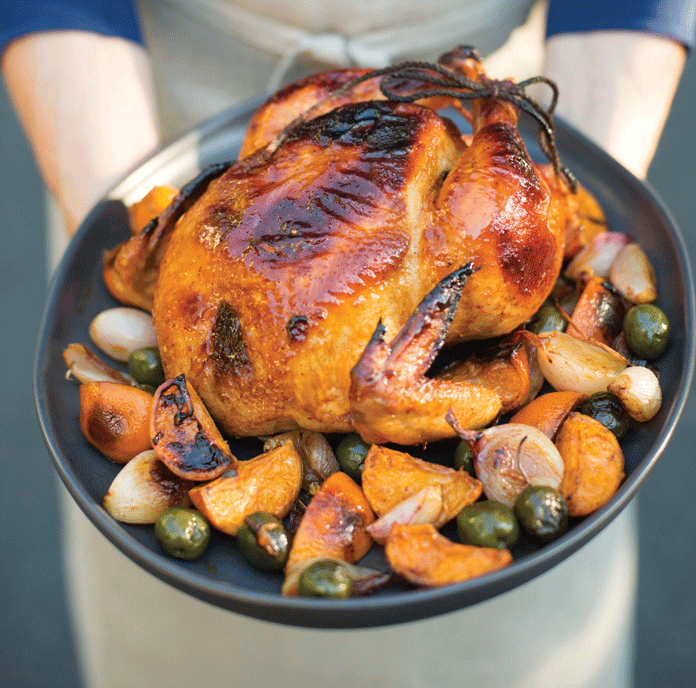Modern Jewish cooking goes far beyond pastrami on rye and kugel. In her book, The Seasonal Jewish Kitchen, Amelia Saltsman uses her Eastern European and Middle Eastern heritage, and farm-to-table background, to put innovative twists on classic recipes, with an emphasis on seasonal flavors. Here are three to try just in time for Hanukkah!
 BEST POTATO LATKES
BEST POTATO LATKES
Serves: 6, Makes 24 Latkes
Prep time: 15 minutes
Cook time: 15 minutes
2 pounds starchy potatoes, peeled
1 small onion
2 heaping tablespoons unbleached all-purpose flour or potato starch
1 teaspoon kosher salt
½ teaspoon baking powder
Freshly ground black pepper
2 eggs, lightly beaten
Mild oil with a medium-high smoke point, such as grapeseed, sunflower, or avocado, for pan-frying
Coarse finishing salt, such as Maldon sea salt
Applesauce and/or sour cream
1. Using the large holes of a box grater or a food processor fitted with the grating disk, grate the potatoes. You should have about 5 cups. Place the potatoes in a sieve to drain. Grate the onion on the large holes of the box grater or fit the processor with the metal S blade and grate. It should look like pulp; mince or discard any large onion pieces.
2. In a large bowl, stir together potatoes, onion, flour, salt, baking powder and a few grinds of pepper. Stir in eggs.
3. Line 2 or 3 sheet pans with paper towels. Place the prepared pans, the latke batter, a large spoon and a spatula near the stove. Heat 1 or 2 large skillets over medium heat. Generously film the skillet(s) with oil (not more than ¼ inch deep). When the oil is shimmering and a tiny bit of batter sizzles on contact, start spooning in the latke batter, making sure to add both solids and liquid. Using the back of the spoon, flatten each spoonful into a circle 3 to 4 inches in diameter. Do not crowd the latkes in the pan. You’ll get 4 or 5 latkes in a 12-inch skillet.
4. Cook the latkes, flipping them once, until golden on both sides, 5 to 6 minutes total. Transfer the latkes to a prepared baking sheet. Cook the remaining batter in the same way, stirring the batter before adding more to the pan and adding oil as needed at the edge of the pan.
5. Arrange the latkes on a warmed platter, sprinkle with finishing salt and serve with applesauce or sour cream.
ROAST CHICKEN WITH TANGERINES, GREEN OLIVES AND SILAN
Serves: 6 TO 8
Prep time: 15 minutes
Cook time: 1 hour 5 minutes
1 chicken, 4 pounds (1.8 kg)
4 tablespoons extra-virgin olive oil
2 tablespoons silan (date syrup)
2 to 3 teaspoons harissa spice mix, harissa paste or ½ teaspoon
each cayenne pepper, smoked paprika, coriander and cumin
1 teaspoon kosher or sea salt
¾ pound shallots
(about 4 large or 8 small)
6 tangerines or other sweet mandarins
1 cup lightly brined green olives, such as Castelveltrano
1 to 2 cups white wine, stock, or water
1. Preheat the oven to 400°F (200°C). Pat the chicken dry. Whisk together olive oil, the silan, harissa to taste and salt. Peel shallots and cut into quarters if large or halves if small. Cut unpeeled tangerines into quarters or sixths and poke out visible seeds.
2. Scatter shallots and tangerines in the bottom of a large roasting pan and toss with a little olive oil and salt. Rub chicken inside and out with the harissa-silan mixture. Toss a few tangerine and shallot pieces into the cavity of the chicken. Place chicken, breast side up, in the pan and tie the legs together loosely with twine, if desired.
3. Roast 30 minutes, baste with juices that have collected in the pan and add the olives. Continue roasting, adding wine to the pan as needed to prevent the juices from burning and basting the bird once or twice more during the cooking, until the skin is a rich brown and the chicken is cooked all the way through, about 30 minutes longer.
4. Transfer chicken, shallots, olives and tangerines to a platter and tent loosely with foil. Place roasting pan on the stove top over medium heat, pour in wine and stir to deglaze the pan, scraping up any brown bits. Cook until heated through, reduced, thickened and glossy, about 2 minutes. To defat the juices, pour them into a fat separator or skim off the fat with a large spoon.
5. Carve the chicken and serve with the shallots, olives, tangerines and the warm pan juices.
 FREEKAH WITH KALE, BUTTERNUT SQUASH AND SMOKED SALT
FREEKAH WITH KALE, BUTTERNUT SQUASH AND SMOKED SALT
Serves: 6
Prep time: 20 to 30 minutes
Cook time: 30 minutes
1 cup freekeh, preferably finely cracked
1 small butternut squash, about
1¼ pounds
1 small bunch tender kale, such as cavolo nero, about 6 ounces, or ¼ pound loose-leaf baby kale
3 tablespoons extra-virgin olive oil
1 teaspoon smoked paprika
Kosher or sea salt
1 small onion, chopped
2½ cups hot water
Smoked salt for finishing
1. If using whole or cracked freekeh, soak in water to cover for at least 6 hours or up to overnight, then drain well. If using finely cracked freekeh, skip this step.
2. Halve the squash and remove and discard the seeds and fibers. Using a vegetable peeler, peel the squash halves, then cut into cubes no larger than 1 inch. You should have about 3 cups. If using a bunch of kale, strip the stems from the leaves and discard, then massage the leaves to tenderize, if you like. If using baby kale, skip this step. Roughly chop the leaves.
3. In a wide pot, heat 1 tablespoon of the oil over medium-high heat. Add the squash, the smoked paprika, and a little kosher salt and cook, stirring occasionally, until the squash is golden in places and crisp-tender, about 10 minutes. Remove from the pot and set aside.
4. Add 1 tablespoon oil, the onion and a bit of salt to the same pot and sauté until the onion is soft and golden, about 10 minutes. Stir in the kale and cook for 2 minutes. Push the kale and onion to the side of the pot. Add the remaining 1 tablespoon oil and the freekeh and cook for 1 minute, stirring to coat the grains with oil. Stir in the water, squash and about ½ teaspoon kosher salt, cover, reduce the heat to medium-low and cook until almost all the water is absorbed and the freekeh is tender, about 20 minutes. Uncover the pot and cook until all the water is absorbed, about 5 minutes longer.
5. Transfer to a serving dish and sprinkle with the smoked salt. Serve warm or at room temperature.
Happy Hanukkah!





